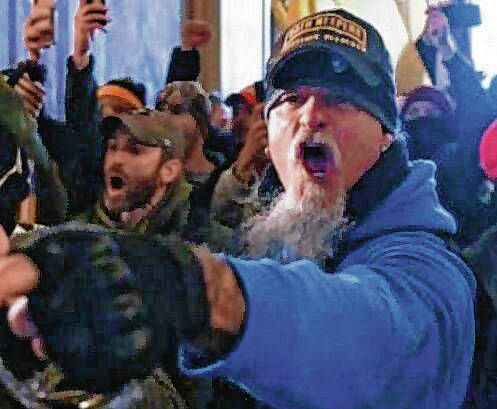WASHINGTON — A federal judge has, for a second time, postponed sentencing for a former Columbus resident who has pleaded guilty to storming the U.S. Capitol on Jan. 6, 2021.
Sentencing for former heavy metal musician and Columbus resident Jon Schaffer had been scheduled for April 5, but U.S. District Judge Amit P. Mehta recently pushed back the hearing until July 19, according to filings in U.S. District Court in Washington, D.C.
The decision comes after Schaffer had asked the court to delay sentencing until September following a decision earlier this month by a federal appeals court to overturn a sentencing enhancement used to help determine another Jan. 6 defendant’s punishment.
It also comes after the Supreme Court decided it would weigh in on the scope of the felony charge of obstructing an official proceeding — one of two charges that Schaffer pleaded guilty to in April 2021.
Last month, Mehta had denied a request to delay sentencing until after the U.S. Supreme Court’s decision but postponed the sentencing hearing from Feb. 20 on medical grounds. The former Oath Keeper and former member of the heavy metal band Iced Earth previously told the judge that he might undergo an undisclosed medical procedure “with the need for a recovery afterwards.”
Though Schaffer had asked to delay sentencing for several months, Mehta said Schaffer “has not demonstrated good cause to continue sentencing of this matter for six months or more,” according to the order.
“The court, however, will continue sentencing after the Supreme Court issues its decision,” Mehta states in the order.
In December, the Supreme Court said it would hear an appeal challenging the scope of the obstruction of an official proceeding charge that has been brought against more than 300 people, including Schaffer and former President Donald Trump, The Associated Press reported. The charge, which carries up to 20 years behind bars, refers to the disruption of Congress’ certification of Joe Biden’s 2020 presidential election victory over Trump.
It is one of two charges that Schaffer pleaded guilty to. He also pleaded guilty to one count of entering and remaining in a restricted building or ground with a deadly or dangerous weapon.
The case that the Supreme Court will hear involves Joseph Fischer, a former Pennsylvania police officer, who is facing a seven-count indictment for his actions on Jan. 6, 2021, including the obstruction charge, and two other defendants, according to wire reports.
In court filings, Fischer’s attorneys argue that he “was not part of the mob that forced the electoral certification to stop” because he arrived at the Capitol grounds on Jan. 6, 2021, “well after Congress recessed.” He pushed his way through the crowd, walked up the east side of the building and entered the Capitol, getting “about 20 feet inside the building.”
“As he neared the police line, the swell of the crowd then knocked Mr. Fischer to the ground,” according to his petition for the Supreme Court to hear his case. “Returning to his feet, Mr. Fischer returned lost equipment, a pair of handcuffs, to a Capitol police officer. He talked with an officer, patting him on the shoulder. Then the weight of the crowd pushed Mr. Fischer into the police line. With that, the Capitol police pepper sprayed the protestors, blinding Mr. Fischer. He exited (the Capitol) four minutes after entering.”
In March 2022, U.S. District Judge Carl Nichols dismissed the obstruction charge, finding that prosecutors stretched the law beyond its scope to inappropriately apply it in these cases, according to the AP. Nichols ruled that a defendant must have taken “some action with respect to a document, record or other object” to obstruct an official proceeding.
The Justice Department challenged that ruling, and the appeals court in Washington agreed with prosecutors in April that Nichols’ interpretation of the law was too limited, prompting Fischer’s lawyers to appeal to the Supreme Court.
Earlier this month, a three-judge panel in the U.S. Court of Appeals for the D.C. Circuit ordered a new sentence for a retired Air Force officer who stormed the U.S. Capitol dressed in combat gear, in a ruling issued that could impact dozens of other cases stemming from the Jan. 6, 2021, attack, according to wire reports.
While the panel upheld Larry Brock’s conviction, the court said a judge wrongly applied an enhancement that lengthened the recommended prison sentence range under federal guidelines.
The enhancement — on the grounds that Brock’s conduct resulted in “substantial interference with the administration of justice” — has been applied in more than 100 other Jan. 6 defendants’ cases, according to wire reports.
About a week after the appellate court’s decision, Schaffer’s attorney, Andrew C. Marcantel of Attorneys for Freedom Law Firm, argued in a motion that the decision, as well as the Supreme Court’s decision to take up the obstruction charge, “have added complexity to the analysis of factors impacting sentencing” for the former heavy metal musician.
Schaffer’s motion states that Assistant U.S. Attorney Ahmed Baset “while not joining in the reasoning, does not object to this motion.”
The motion also states that Schaffer is “gainfully employed and compliant with all conditions of his release.”





